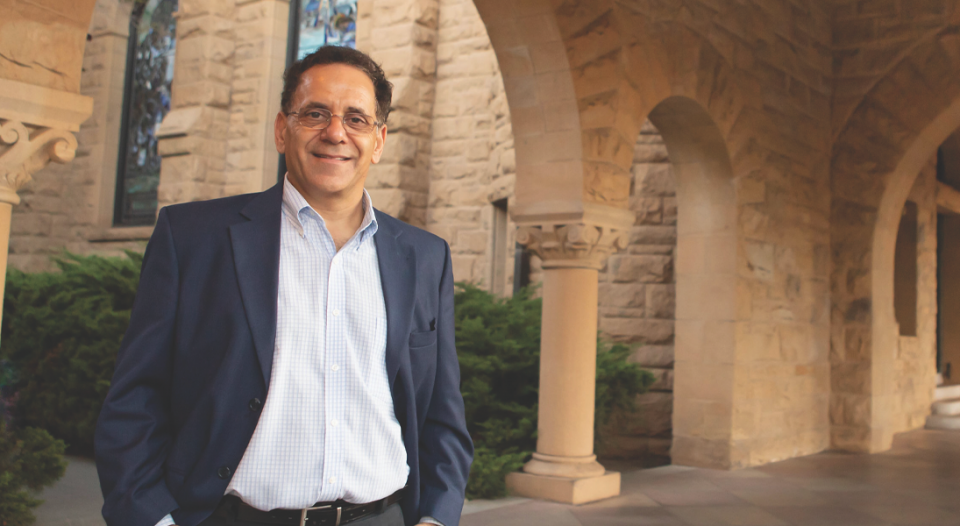Editor’s note: As we near the end of April, we are reposting Fuad Nijim’s “I’m a Lutheran” column to celebrate Arab and Middle Eastern heritage. See also “A conversation with Margarette Ouji” and “A conversation with Charbel Zgheib.”
Grace Lutheran Church, Palo Alto, Calif.
Finance and administration, Stanford (Calif.) University Department of Radiology; lay leader with the Association of Lutherans of Arab and Middle Eastern Heritage and with ELCA Ethnic Specific and Multicultural Ministries
Growing up as a pastor’s kid felt like being part of a large family—everyone at church was like a sibling, a cousin, an aunt or an uncle. My congregation, Evangelical Lutheran Church of Hope in Ramallah (West Bank), was and is a close-knit community with so much energy and joy. My favorite moment there was when I was confirmed by my dad, Pastor Bassem Nijim. Each confirmand received a Bible as a gift and a verse specially chosen for him or her. Mine was “Be on your guard; stand firm in the faith; be courageous; be strong. Do everything in love” (1 Corinthians 16:13-14; New International Version).
While studying at St. Olaf College, I served as an international student counselor during my sophomore year. I was part of a four-person team entrusted with helping international students adjust and integrate with the campus community. I remember being the co-emcee during the spring 1981 Annual International Night, a performance of music, dance and poetry from different parts of the world, followed by a festive dinner to celebrate the diversity and rich cultures of the world that we live in.
After 20 years at Stanford, I’m most energized by the students and their faculty. I cannot stop being amazed at their dynamic and ceaseless striving for knowledge and new ideas, and their drive to break through new frontiers. I take every opportunity I can to read some of the papers they publish.
When my congregation (Grace) traveled to Palestine in spring 2011, we visited Hope, my home congregation, and held a joint bilingual worship service in Arabic and English. Afterward, the two congregations mingled together during a social hour. This was a very special moment for me. It was a time when both parts of my cultural identity—Palestinian and American—blended into one, socially, spiritually and in prayer.
Christians of the Holy Land carry the cultural heritage of the Bible. How we read and interpret Bible stories is connected to our heritage that is traced back to biblical times. We bring added value, help complete the contextual theology of today and weave threads of our own colors into the tapestry that is the church.
I was only 6 years old when tanks rolled into my hometown. It started with hearing loud explosions one evening. We rushed to the basement of the church parsonage and stayed there for six days and nights. My childhood and school years were tainted with Israeli soldiers roaming the streets and stopping us at checkpoints. These intense experiences and memories shaped my identity and spirituality.
Christians of the Holy Land help complete the contextual theology of today and weave threads of our own colors into the tapestry that is the church.
As a founding member of the Association of Lutherans of Arab and Middle Eastern Heritage, I worked tirelessly alongside others to draft and edit our bylaws and vision statement. The ELCA Churchwide Assembly accepted our association in 1993 after a 1992 consultation with Middle Eastern origin Lutherans. We were elated to become the fifth ethnic community acknowledged by our church.
What I love most about working with multicultural ministries is how they bring together people with different languages and cultures. We share stories, dreams and hopes, and enrich our church and community with our music, prayer and faith stories. There’s a long and vibrant history of our church ministry through its Commission for Multicultural Ministries (now called Ethnic Specific and Multicultural Ministries). I clearly recall being part of the 2000 Multicultural Mission Institute gathering in Los Angeles in November of that year, which included numerous presentations, workshops, discussions, and sharing worship and hymns in different languages and cultures. It was truly enriching and powerful.
One thing that might surprise people about me is that I am a musician. I grew up learning music and piano throughout my years at Ramallah Friends School and at St. Olaf College, and I enjoy playing piano during my free time. I was a member of Grace’s bell choir for years. We’d perform separately [or] jointly with the church choir or accompany the congregation during hymns.
I hope that our church will continue to invest in ministry and outreach to all the ethnic communities, and to join the struggle toward a just society for all. As our communities become increasingly multiethnic and multicultural, our call to bring to the table and lift up the voiceless becomes increasingly valuable. I hope that faith, prayer and songs that are multicultural will one day become common in the Lutheran church.
I pray for more compassion and understanding among people and for tolerance and harmony in our communities, especially during these trying times.
I see God in people, in nature and in the beauty of its flowers, trees, mountains, rivers and the oceans. I believe that, through God, all of us are custodians of the lands we walk on and are entrusted by him to protect and nourish creation.
I’m a Lutheran because I was baptized and confirmed into the faith. I enjoy and deeply cherish beautiful Lutheran hymns and liturgy, through which I affirm my faith. Faith is our relationship to God that we hold dear inside and try to express during our daily lives.





